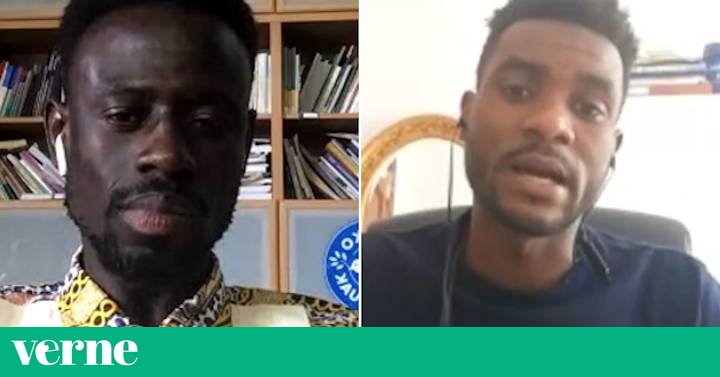For the anti-racist activist Mamadou Ngom (36 years old), the real challenge in the fight against racism lies in social awareness. "A white person may not be racist in his personal relationships, but he has to understand that racism is a type of structural violence that unfortunately continues to be present in many areas of society such as education, sports, art, journalism ... "Ngom explains to Verne in a phone conversation.
Since May, this Senegalese, who arrived in Bilbao in 2007, has been running the Virtual Anti-racist School, an initiative promoted by the organization Médicos del Mundo Euskadi, in which Ngom is also a technician in social intervention and cultural mediation. The classes of this demanding school are on Instagram (direct every Friday from 6:00 p.m. to 7:00 p.m. until July 24) and its teachers, anti-racist activists interviewed by Ngom - known on social networks as Marra Junior -.
"The objective of this project is to sensitize society to racist behaviors. Sometimes these behaviors are very evident and intentional, like racially motivated hate speech, but other times they are more subtle messages that we see in an advertisement, in a series , in a story ... you also have to learn to identify and combat it, "explains Ngom.
These virtual anti-racist classes have already included Samuel Malan, from the Alcemos la Voz África collective, who explained, among other things, what it is like to work as a day laborer in a greenhouse, an experience that allowed him to pay for his university studies in labor rights. "A reality - as Ngom says - unknown to society in general; people do not know the working conditions of these workers and that, for example, is also a type of racism." Ngom clarifies that the idea of these virtual classes "is to address issues that put racist behavior in Spanish society in front of the mirror."
Eldiario.es journalist Moha Gerehou was another of the speakers. In his speech he narrated what it is like to develop your profession in a European country as a racialized person. For this journalist, his case within journalism is "an exception", which does not agree with the greater ethnic-racial diversity seen in the Spanish streets. Gerehou warns that one of the consequences of not having representation from racialized journalists is that not addressing issues from an anti-racist perspective. Another journalist who has also participated in the School is Lucía Mbomio, who spoke during her speech about racism in the cinema.
Gypsy activists such as Rosa Jiménez, from the Sim Romi Association of Gypsy Women and María José Jiménez Gurú, from the Association of Gypsy Feminists for Diversity, recounted the reality of their community, and especially women, and their relationship with institutions . Jiménez Gurú denounced that the needs of the gypsy people, for example, are usually officially channeled by institutions linked to religion and directed by payos and men. For her, this is a form of institutional anti-gypsyism that makes it difficult to obtain fair policies for the Roma people. To address other cases of ethnic-racial discrimination directed at the Muslim community in Spain, the Virtual Anti-Racist School also invited Míriam Hatibi.
The start of this virtual initiative by Médicos del Mundo Euskadi coincided with the tragic news of the murder of the African-American citizen George Floyd at the hands of a white police officer on May 25. Ngom himself recalled in one of the Instagram reports the need to demand justice for this fact, specifically, and for the police violence that racialized communities have generally suffered in general.
Another significant date that has coincided with this cycle of virtual classes is the celebration of International Refugee Day, on June 20. The talk the day before was given by the activist Sani Ladan, who dedicated it precisely to Human Rights and freedom of movement.
At Médicos del Mundo Euskadi they are satisfied with the virtual assistance of these classes, "more than 50 people in each session", among which are also non-racialized people. "From the comments we receive, we understand that there are many white people who are watching these interviews. People who have never before been interested in the anti-racist speech and who have even opened an Instagram account to see us every Friday. And we find it very interesting because that's what we need: allies of anti-racism, "says Ngom.
This first edition of the Virtual Anti-racist School will continue during the month of July. These meetings will address racism in education, with Yosi Hatillo, from the Afrogalegas collective (July 10), and María, from the Antracist School in Barcelona (July 17); or art, with Lis Es Beth, from the Raízes Bilbo collective (July 24). "Art, like any other social sphere, has also been historically constructed from a white perspective, generating a lot of frustration for racialized artists," says artist Lis Es Beth, whose presentation will focus precisely on "pain".
Born in the Canary Islands 25 years ago and of Andean descent, Lis Es Beth will tell about her experience in the art world and how her works convey "the pain of a life crossed by structural racism". "It is important to understand how racism is run as a social tool of discrimination and that has marked you since you were little," says the artist. "The most significant thing is that this pain expressed through art is not understood by non-racialized people who in many cases feel uncomfortable with these discourses," she says, referring to her own experience.
See this post on Instagram
NON-PRODUCTIVE ❌❌❌❌❌❌ ✴️✴️✴️✴️✴️✴️ ⚡⚡⚡⚡⚡⚡ 💧💧💧💧💧💧. ? #art #artist?
A post shared by Lis Es Beth (@lis_es_beth) on May 9, 2020 at 11:00 PDT
* You can also follow us on Instagram and Flipboard. Don't miss the best of Verne!








/cloudfront-eu-central-1.images.arcpublishing.com/prisa/5WV46BCDGZEX7ICQ3DHPMIKJLM.jpg)






